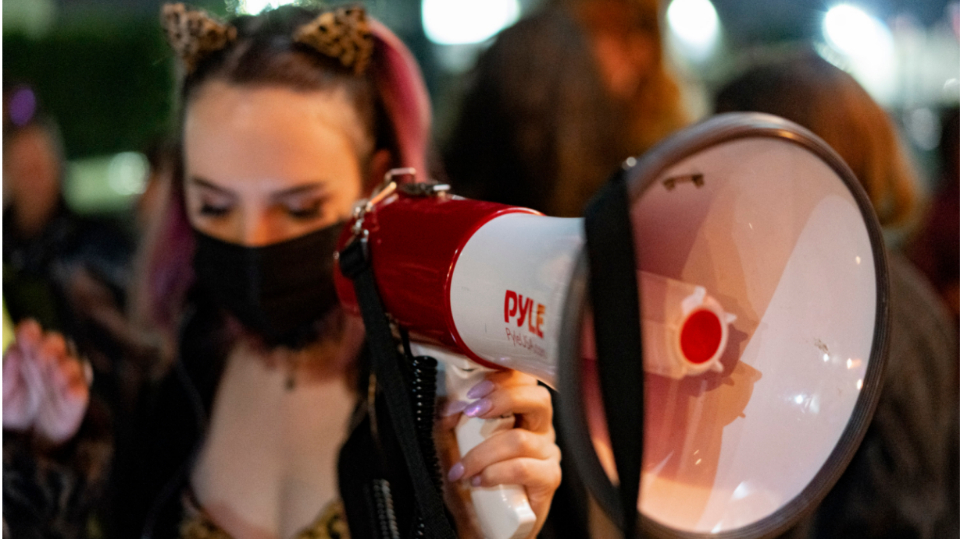
The picket line on Lankershim Boulevard in North Hollywood has been loud, energetic, flamboyant, and…costumed. The strippers from Star Gardens have organized for their protection and become a cause célèbre for other organizers and unions across the country.
The exotic dancers, now formally employed by Star Gardens, have hosted theme nights—like the recent Sexpionage and French Revolution nights—which have been very popular, drawing a lot of attention from both local and national media.
“Dancers from other clubs, other sex workers, and organizers from all over the country, even our highest-paying customers, have joined us on the picket line,” Charm, a Hollywood-based stripper and spokesperson for the striking dancers, told People’s World.
The strippers of Star Gardens in North Hollywood have been on strike for nearly ten weeks and are now fighting to get their newly-formed union, with Strippers United, recognized. The dancers staged a walkout after management fired two of them over security concerns.
The strike began when dancers were locked out from the club shortly after bringing up safety issues at the workplace. When management fired two dancers over their concerns, their co-workers walked out.
The second dancer to be fired was told they were “creating drama” when they went to club security over a problematic customer. A few days later, club managers told the other dancers that they must bring concerns to management first and that security is not to be involved unless management says so.
“We thought security was there for us—to keep customers within club guidelines,” explained Charm. “We put together a petition requesting that our fired coworkers be reinstated, requesting copies of our contracts—which we have never actually been given, and reversing the policy about going to management first…we all strongly believed in it and three-quarters of us signed it.”
However, when management refused to accept the petition the following Friday night, dancers were told that if they didn’t feel comfortable working they could leave and come back when they did.
“We had a walkout—everyone who signed—we all walked out together. We came back the next day at the same time and waited until someone would read and consider [the petition] before going back to work,” the spokesperson said. “But there was a rope in front of the door and security informed us we were not allowed to go in and work that night…. We saw this as a lockout, as retaliation.”
Workers say Star Gardens’ managers Steve and Jenny Kazaryan have a long history of not listening, as is evident by the experiences of fired dancers.
“We decided it was time to start picketing…. We are obviously dealing with an employer and business model that seeks to separate us so we don’t have the power we have when we’re together,” Charm explained.
OSHA has also been involved with several health and hygiene issues at Star Gardens in the recent past, and former employees decided to showcase these by dressing up as the violations. This creativity is not new among the dancers either. When clubs were closed, the strippers were able to explore new ways of making their work exciting.
“We began doing virtual shows [during the pandemic], we were able to get super creative with the form of erotic dancing and art—it wasn’t just your look and the dancing,” said Charm.
“People were doing narrative storytelling, costumes, and it got a lot of us in touch with the art and comedy of dancing that has been stifled by clubs…. Management doesn’t necessarily encourage that kind of creative work and exploration, which I think is the essence of stripping: having fun and being playful with sexuality.”
The strippers of North Hollywood have found creative expression in their organizing and, like others on strike in the U.S., have made striking not just hopeful but fun.
“[Our solidarity] has only increased. We have become stronger and closer than ever before. When you’re working in the club, it’s easy to not get to know your co-workers,” the former Star Gardens employee explained.
“Everyone’s often working with a persona, and you don’t necessarily get to know people you normally would in a traditional workplace. We have the advantage of getting to know one another inside/outside the club now, and it’s strengthened the bond.”
It’s not just solidarity with former co-workers, but those who were terminated before and even those in other industries altogether.
“Previously fired dancers have joined the line, we have people from the Teamsters and other unions from other industries joining us,” said Charm. “We have dealt with scabs, but there are very few. Most scabs don’t want to face us or cross the line while we’re there.”
The locked-out workers hope to get the union formally recognized and have filed multiple charges with the NLRB, but that is not the only goal.
“The ultimate goal down the line is to open a worker-owned, co-op style strip club—run by sex workers for sex workers—without all of the wage theft, danger, and scary shit,” explains Charm. “Without all the racist and transphobic and fat-phobic and ableist hiring practices which are so normalized in the strip club industry.”

As Ana Kasparian of The Young Turks points out, “[t]hey don’t see themselves as helpless victims. They see themselves as fighters.” As the picket line has demonstrated nightly, the camaraderie among the dancers is relentless and inspiring, and fits Kasparian’s assessment.
Sex work is often trivialized by arguments that the industry itself is uniquely dangerous and exploitative, and any safety concerns ought to be of no surprise. The common narratives of sex workers as being only victims is challenged by the focus that the former strippers of Star Gardens are putting on workers’ rights.
As Detroit-based sex worker Parker Westwood, puts it, “SWERFs (Sex Worker-Exclusionary Radical Feminists) like to say that sex work is inherently coercive because money is involved, but that is true of all kinds of work under capitalism. There are very few people out there who would continue to do their jobs if they ceased to be paid for it.”
Westwood says, “The criminalization of sex work is what makes it more dangerous, more violent—we’re not seen as human, but rather subhuman.”
Suggesting sex workers should expect violence in their industry shows an indifference that compounds the effect of the violence itself, reducing the people in these roles to mere effects of a larger problem—i.e. state-based violence and economic exploitation—which gets a free pass for this one specific industry. It seems more important to take seriously the connection people feel with this movement.
“Our struggle resonates with a lot of people,” said Charm. “The shit we deal with from our employers [is something] a lot of service industry and manual labor people would relate to.”
One thing that has become truly evident to the striking strippers of North Hollywood: “We don’t need a club or a manager—we can do this on our own.”
As with many news, analytical, and op-ed articles published by People’s World, any opinions reflected in this article are solely those of its author.












Comments